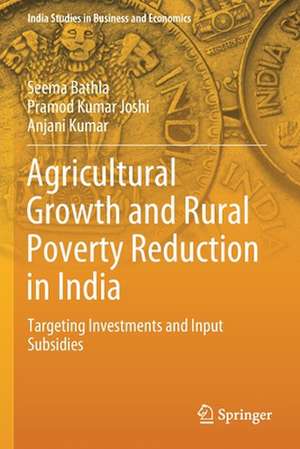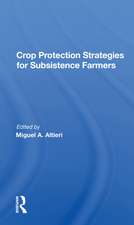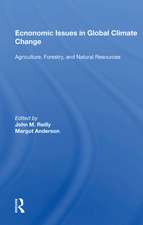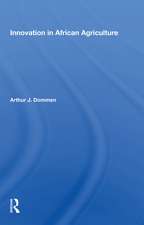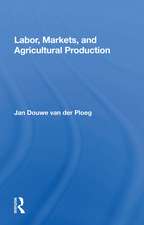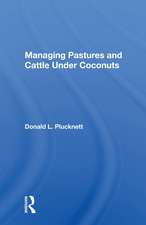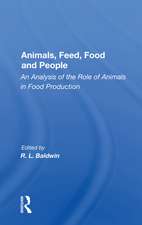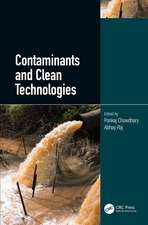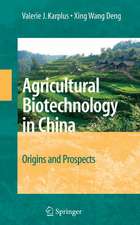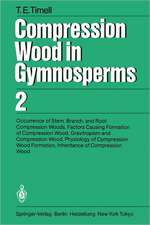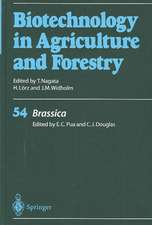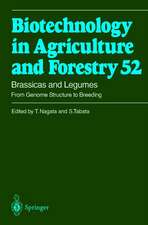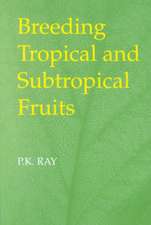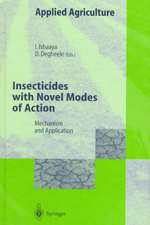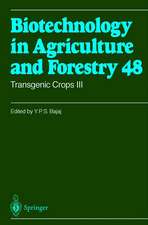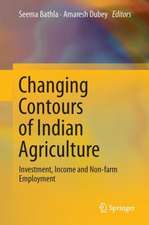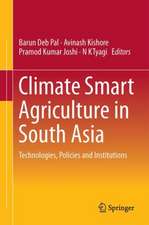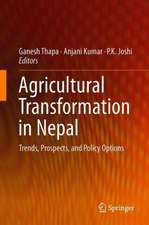Agricultural Growth and Rural Poverty Reduction in India: Targeting Investments and Input Subsidies: India Studies in Business and Economics
Autor Seema Bathla, Pramod Kumar Joshi, Anjani Kumaren Limba Engleză Paperback – 20 mar 2021
| Toate formatele și edițiile | Preț | Express |
|---|---|---|
| Paperback (1) | 633.35 lei 43-57 zile | |
| Springer Nature Singapore – 20 mar 2021 | 633.35 lei 43-57 zile | |
| Hardback (1) | 639.41 lei 43-57 zile | |
| Springer Nature Singapore – 20 mar 2020 | 639.41 lei 43-57 zile |
Din seria India Studies in Business and Economics
- 18%
 Preț: 897.65 lei
Preț: 897.65 lei -
 Preț: 361.77 lei
Preț: 361.77 lei - 18%
 Preț: 1006.24 lei
Preț: 1006.24 lei - 18%
 Preț: 952.89 lei
Preț: 952.89 lei - 20%
 Preț: 883.20 lei
Preț: 883.20 lei -
 Preț: 186.41 lei
Preț: 186.41 lei - 15%
 Preț: 636.94 lei
Preț: 636.94 lei - 15%
 Preț: 647.27 lei
Preț: 647.27 lei - 15%
 Preț: 646.30 lei
Preț: 646.30 lei -
 Preț: 409.89 lei
Preț: 409.89 lei -
 Preț: 372.98 lei
Preț: 372.98 lei -
 Preț: 389.88 lei
Preț: 389.88 lei - 18%
 Preț: 894.03 lei
Preț: 894.03 lei - 15%
 Preț: 644.30 lei
Preț: 644.30 lei - 15%
 Preț: 528.30 lei
Preț: 528.30 lei - 15%
 Preț: 643.65 lei
Preț: 643.65 lei - 15%
 Preț: 644.82 lei
Preț: 644.82 lei - 15%
 Preț: 660.37 lei
Preț: 660.37 lei -
 Preț: 386.00 lei
Preț: 386.00 lei - 20%
 Preț: 559.74 lei
Preț: 559.74 lei - 15%
 Preț: 643.99 lei
Preț: 643.99 lei -
 Preț: 386.68 lei
Preț: 386.68 lei -
 Preț: 390.08 lei
Preț: 390.08 lei -
 Preț: 365.76 lei
Preț: 365.76 lei -
 Preț: 393.52 lei
Preț: 393.52 lei - 15%
 Preț: 656.74 lei
Preț: 656.74 lei - 24%
 Preț: 699.22 lei
Preț: 699.22 lei -
 Preț: 369.80 lei
Preț: 369.80 lei - 15%
 Preț: 642.68 lei
Preț: 642.68 lei -
 Preț: 388.90 lei
Preț: 388.90 lei - 15%
 Preț: 649.87 lei
Preț: 649.87 lei - 15%
 Preț: 645.28 lei
Preț: 645.28 lei -
 Preț: 372.66 lei
Preț: 372.66 lei -
 Preț: 389.17 lei
Preț: 389.17 lei - 20%
 Preț: 569.00 lei
Preț: 569.00 lei - 15%
 Preț: 641.85 lei
Preț: 641.85 lei -
 Preț: 392.97 lei
Preț: 392.97 lei - 15%
 Preț: 643.84 lei
Preț: 643.84 lei - 24%
 Preț: 656.29 lei
Preț: 656.29 lei - 15%
 Preț: 651.34 lei
Preț: 651.34 lei - 15%
 Preț: 641.53 lei
Preț: 641.53 lei - 15%
 Preț: 640.37 lei
Preț: 640.37 lei - 20%
 Preț: 569.85 lei
Preț: 569.85 lei
Preț: 633.35 lei
Preț vechi: 745.11 lei
-15% Nou
Puncte Express: 950
Preț estimativ în valută:
121.19€ • 126.87$ • 100.28£
121.19€ • 126.87$ • 100.28£
Carte tipărită la comandă
Livrare economică 07-21 aprilie
Preluare comenzi: 021 569.72.76
Specificații
ISBN-13: 9789811535864
ISBN-10: 9811535868
Ilustrații: XVIII, 132 p. 14 illus., 10 illus. in color.
Dimensiuni: 155 x 235 mm
Greutate: 0.22 kg
Ediția:1st ed. 2020
Editura: Springer Nature Singapore
Colecția Springer
Seria India Studies in Business and Economics
Locul publicării:Singapore, Singapore
ISBN-10: 9811535868
Ilustrații: XVIII, 132 p. 14 illus., 10 illus. in color.
Dimensiuni: 155 x 235 mm
Greutate: 0.22 kg
Ediția:1st ed. 2020
Editura: Springer Nature Singapore
Colecția Springer
Seria India Studies in Business and Economics
Locul publicării:Singapore, Singapore
Cuprins
Introduction.- Contextualising Public Intervention in Agriculture and Welfare Effects.- Spatial Patterns in Public Expenditure, Subsidies, and Outcomes.- Changing Composition of Private Investment and its Relation to Public Investment and Input Subsidy in Agriculture.- Welfare Effects of Investments and Input Subsidies.- Major Findings, Implications and Reflections on Input Subsidy.
Notă biografică
Seema Bathla is a Professor, CSRD, JNU, New Delhi. Before joining the JNU, she worked at the Institute of Economic Growth, The Energy Research Institute and Delhi University. She obtained her M.Phil. from Delhi School of Economics and her Ph.D. from the JNU. She has 27 years of work experience and has published four books (three co-authored) and more than 45 research articles in refereed national and international journals. With a keen interest in agricultural issues, she has conducted several studies and undertaken assignments for the World Bank, IFPRI, UNCTAD, WWF-India, and IASRI. She was conferred the Jawaharlal Nehru Award for Outstanding Postgraduate Agricultural Research by the Indian Council of Agriculture Research, New Delhi, in 2008. She is also the recipient of the Dr. R.T. Doshi award for best paper published in Agricultural Economics Research Review in 2014 and 2015, and the Dr. A K Sen award for the best book published in 2018.
Pramod K. Joshi is a former Director for South Asia at the International Food Policy Research Institute, New Delhi. He has also served as Director of the National Academy of Agricultural Research Management, Hyderabad, India; Director of the National Centre for Agricultural Economics and Policy Research, New Delhi; South Asia Coordinator at the International Food Policy Research Institute; and a Senior Economist at the International Crops Research Institute for the Semi-Arid Tropics in Patancheru. His research areas include technology policy, market, and institutional economics.
Anjani Kumar is a Research Fellow at the International Food Policy Research Institute, New Delhi. Before joining the IFPRI, he was a Principal Scientist (Agricultural Economics) at the International Crops Research Institute for the Semi-Arid Tropics, Hyderabad. He has also served as a Principal Scientist at the National Centre for Agricultural Economics and Policy Research, New Delhi; a Senior Agricultural Economist at the Asia Office of the International Livestock Research Institute, Nairobi; and a Consultant for a number of national and international institutions including the FAO, World Bank, IFPRI, National Agricultural Cooperative Marketing Federation of India (NAFED), and the Department of Science and Technology (DST), Government of India. Having written over 70 research papers and more than 50 book chapters, he is a Fellow of the National Academy of Agricultural Sciences of India and has won numerous national and international awards.
Pramod K. Joshi is a former Director for South Asia at the International Food Policy Research Institute, New Delhi. He has also served as Director of the National Academy of Agricultural Research Management, Hyderabad, India; Director of the National Centre for Agricultural Economics and Policy Research, New Delhi; South Asia Coordinator at the International Food Policy Research Institute; and a Senior Economist at the International Crops Research Institute for the Semi-Arid Tropics in Patancheru. His research areas include technology policy, market, and institutional economics.
Anjani Kumar is a Research Fellow at the International Food Policy Research Institute, New Delhi. Before joining the IFPRI, he was a Principal Scientist (Agricultural Economics) at the International Crops Research Institute for the Semi-Arid Tropics, Hyderabad. He has also served as a Principal Scientist at the National Centre for Agricultural Economics and Policy Research, New Delhi; a Senior Agricultural Economist at the Asia Office of the International Livestock Research Institute, Nairobi; and a Consultant for a number of national and international institutions including the FAO, World Bank, IFPRI, National Agricultural Cooperative Marketing Federation of India (NAFED), and the Department of Science and Technology (DST), Government of India. Having written over 70 research papers and more than 50 book chapters, he is a Fellow of the National Academy of Agricultural Sciences of India and has won numerous national and international awards.
Textul de pe ultima copertă
This book provides a blueprint for the allocation of public expenditures “in” and “for” agriculture at the dis-aggregated state level and suggests a reorientation in favour of disadvantaged regions where the marginal returns on additional investments would be higher. It provides insights into the inter-linkages between public expenditures, private investment, rural poverty, and agriculture productivity from a regional perspective to reflect upon spatial differences in the welfare effects of various investments, subsidies, and policies. The book focuses on agricultural growth and rural poverty reduction through public and private investments, non-farm employment, and other pathways to the formulation of appropriate policies at the dis-aggregated state level. It presents new evidence based on advanced econometric tools for analysing and understanding the relationship between public and private investments in agriculture and input subsidies (fertilizer, power, irrigation, and credit) together with their impacts at the dis-aggregated state level. The book also deliberates on an income based direct support system for farmers as an alternative to the existing input price subsidy regime. Accordingly, the book offers valuable insights not only for researchers working on poverty alleviation, rural economy, and agricultural growth, but also for policymakers.
Caracteristici
Provides a concise analysis of public expenditures on social and economic services in the context of government intervention in agriculture Comprehensively evaluates the impacts of various public investments and input subsidies on agricultural productivity and rural poverty based on state-level data Includes a detailed assessment of the “crowding in” relationship between public and private capital formation in agriculture at the state level based on nationally representative data Identifies location-specific policy interventions in both farm and non-farm sectors used to improve land productivity, farmer incomes, and rural employment
